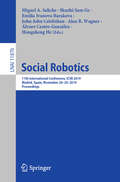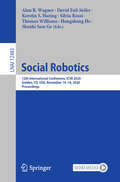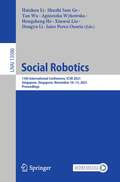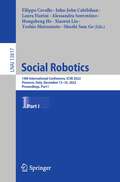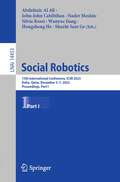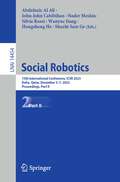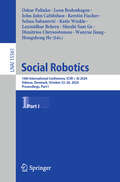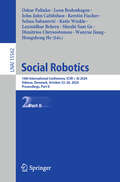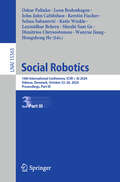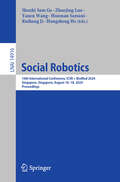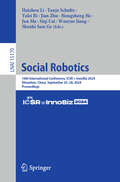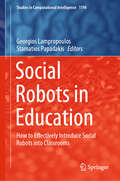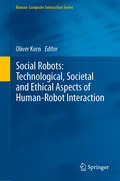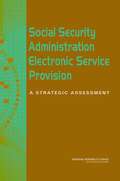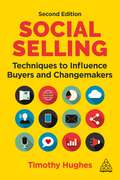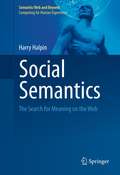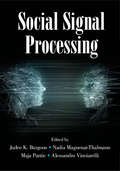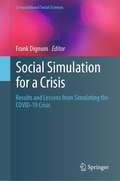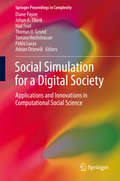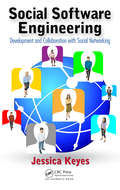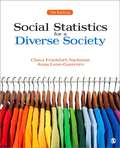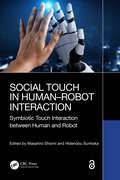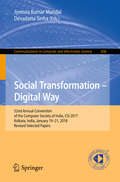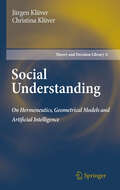- Table View
- List View
Social Robotics: 11th International Conference, ICSR 2019, Madrid, Spain, November 26–29, 2019, Proceedings (Lecture Notes in Computer Science #11876)
by Shuzhi Sam Ge John-John Cabibihan Miguel A. Salichs Hongsheng He Alan R. Wagner Álvaro Castro-González Emilia Ivanova BarakovaThis book constitutes the refereed proceedings of the 11th International Conference on Social Robotics, ICSR 2019, held in Madrid, Spain, in November 2019.The 69 full papers presented were carefully reviewed and selected from 92 submissions. The theme of the 2018 conference is: Friendly Robotics.The papers focus on the following topics: perceptions and expectations of social robots; cognition and social values for social robots; verbal interaction with social robots; social cues and design of social robots; emotional and expressive interaction with social robots; collaborative SR and SR at the workplace; game approaches and applications to HRI; applications in health domain; robots at home and at public spaces; robots in education; technical innovations in social robotics; and privacy and safety of the social robots.
Social Robotics: 12th International Conference, ICSR 2020, Golden, CO, USA, November 14–18, 2020, Proceedings (Lecture Notes in Computer Science #12483)
by Thomas Williams Shuzhi Sam Ge Hongsheng He Alan R. Wagner Silvia Rossi David Feil-Seifer Kerstin S. HaringThis book constitutes the refereed proceedings of the 12th International Conference on Social Robotics, ICSR 2020, held in Golden, CO, USA, in November 2020. The conference was held virtually.The 57 full papers presented were carefully reviewed and selected from 101 submissions. The theme of the 2020 conference is Entertaining Robots. The papers focus on the following topics: human-robot trust and human-robot teaming, robot understanding and following of social and moral norms, physical and interaction design of social robots, verbal and nonverbal robot communication, interactive robot learning, robot motion and proxemics, and robots in domains such as education and healthcare.
Social Robotics: 13th International Conference, ICSR 2021, Singapore, Singapore, November 10–13, 2021, Proceedings (Lecture Notes in Computer Science #13086)
by Shuzhi Sam Ge Yan Wu Hongsheng He Haizhou Li Agnieszka Wykowska Xiaorui Liu Dongyu Li Jairo Perez-OsorioThis book constitutes the refereed proceedings of the 13th International Conference on Social Robotics, ICSR 2021, held in Singapore, Singapore, in November 2021. The conference was held as a hybrid event.The 64 full papers and 15 short papers presented were carefully reviewed and selected from 114 submissions. The conference presents topics on humans and intelligent robots and on the integration of robots into the fabric of our society. The theme of the 2021 edition was “Robotics in our everyday lives”, emphasizing on the increasing importance of robotics in human daily living.
Social Robotics: 14th International Conference, ICSR 2022, Florence, Italy, December 13–16, 2022, Proceedings, Part I (Lecture Notes in Computer Science #13817)
by Shuzhi Sam Ge John-John Cabibihan Hongsheng He Filippo Cavallo Xiaorui Liu Laura Fiorini Alessandra Sorrentino Yoshio MatsumotoThe two-volume set LNAI 13817 and 13818 constitutes the refereed proceedings of the 14th International Conference on Social Robotics, ICSR 2022, which took place in Florence, Italy, in December 2022. The 111 papers presented in the proceedings set were carefully reviewed and selected from 143 submissions. The contributions were organized in topical sections as follows: Social robot navigation and interaction capabilities (voice, tactile); Social robot perception and control capabilities; Investigating non verbal interaction with Social robots; Foster attention and engagement strategies in social robots; Special Session 1: Social Robotics Driven by Intelligent Perception and Endogenous Emotion-Motivation Core; Special Session 2: Adaptive behavioral models of robotic systems based on brain-inspired AI cognitive architectures; Advanced HRI capabilities for interacting with children; Social robots as advanced educational tool; Social robot applications in clinical and assistive scenarios; Collaborative social robots through dynamic game; Design and evaluate user’s robot perception and acceptance; Ethics, gender & trust in social robotics.
Social Robotics: 15th International Conference, ICSR 2023, Doha, Qatar, December 3–7, 2023, Proceedings, Part I (Lecture Notes in Computer Science #14453)
by Shuzhi Sam Ge John-John Cabibihan Hongsheng He Silvia Rossi Nader Meskin Abdulaziz Al Ali Wanyue JiangThe two-volume set LNAI 14453 and 14454 constitutes the refereed post-conference proceedings of the 15th International Conference on Social Robotics, ICSR 2023, held in Doha, Qatar, during December 4–7, 2023. The 68 revised full papers presented in these proceedings were carefully reviewed and selected from 83 submissions. They deal with topics around the interaction between humans and intelligent robots and on the integration of robots into the fabric of society. This year the special topic is "Human-Robot Collaboration: Sea; Air; Land; Space and Cyberspace”, focusing on all physical and cyber-physical domains where humans and robots collaborate.
Social Robotics: 15th International Conference, ICSR 2023, Doha, Qatar, December 3–7, 2023, Proceedings, Part II (Lecture Notes in Computer Science #14454)
by Shuzhi Sam Ge John-John Cabibihan Hongsheng He Silvia Rossi Nader Meskin Abdulaziz Al Ali Wanyue JiangThe two-volume set LNAI 14453 and 14454 constitutes the refereed post-conference proceedings of the 15th International Conference on Social Robotics, ICSR 2023, held in Doha, Qatar, during December 4–7, 2023. The 68 revised full papers presented in these proceedings were carefully reviewed and selected from 83 submissions. They deal with topics around the interaction between humans and intelligent robots and on the integration of robots into the fabric of society. This year the special topic is "Human-Robot Collaboration: Sea; Air; Land; Space and Cyberspace”, focusing on all physical and cyber-physical domains where humans and robots collaborate.
Social Robotics: 16th International Conference, ICSR + AI 2024, Odense, Denmark, October 23–26, 2024, Proceedings, Part I (Lecture Notes in Computer Science #15561)
by Shuzhi Sam Ge John-John Cabibihan Hongsheng He Laxmidhar Behera Dimitrios Chrysostomou Wanyue Jiang Selma Šabanović Oskar Palinko Leon Bodenhagen Kerstin Fischer Katie WinkleThe 3-volume set LNAI 15561-15563 constitutes the refereed proceedings of the 16th International Conference on Social Robotics, ICSR + AI 2024, held in Odense, Denmark, during October 23–26, 2024. The 109 full papers and 19 short papers included in the proceedings were carefully reviewed and selected from 182 submissions. The theme of this year's conference was "Empowering Humanity: The Tole of Social and Collaborative Robotics in Shaping Our Future". The contributions focus on social robotics and AI across the domains of the visual and performing arts, including design, music, live performance, and interactive installations.
Social Robotics: 16th International Conference, ICSR + AI 2024, Odense, Denmark, October 23–26, 2024, Proceedings, Part II (Lecture Notes in Computer Science #15562)
by Shuzhi Sam Ge John-John Cabibihan Hongsheng He Laxmidhar Behera Dimitrios Chrysostomou Wanyue Jiang Selma Šabanović Oskar Palinko Leon Bodenhagen Kerstin Fischer Katie WinkleThe 3-volume set LNAI 15561-15563 constitutes the refereed proceedings of the 16th International Conference on Social Robotics, ICSR + AI 2024, held in Odense, Denmark, during October 23–26, 2024. The 109 full papers and 19 short papers included in the proceedings were carefully reviewed and selected from 182 submissions. The theme of this year's conference was "Empowering Humanity: The Tole of Social and Collaborative Robotics in Shaping Our Future". The contributions focus on social robotics and AI across the domains of the visual and performing arts, including design, music, live performance, and interactive installations.
Social Robotics: 16th International Conference, ICSR + AI 2024, Odense, Denmark, October 23–26, 2024, Proceedings, Part III (Lecture Notes in Computer Science #15563)
by Shuzhi Sam Ge John-John Cabibihan Hongsheng He Laxmidhar Behera Dimitrios Chrysostomou Wanyue Jiang Selma Šabanović Oskar Palinko Leon Bodenhagen Kerstin Fischer Katie WinkleThe 3-volume set LNAI 15561-15563 constitutes the refereed proceedings of the 16th International Conference on Social Robotics, ICSR + AI 2024, held in Odense, Denmark, during October 23–26, 2024. The 109 full papers and 19 short papers included in the proceedings were carefully reviewed and selected from 182 submissions. The theme of this year's conference was "Empowering Humanity: The Tole of Social and Collaborative Robotics in Shaping Our Future". The contributions focus on social robotics and AI across the domains of the visual and performing arts, including design, music, live performance, and interactive installations.
Social Robotics: 16th International Conference, ICSR + BioMed 2024, Singapore, Singapore, August 16–18, 2024, Proceedings (Lecture Notes in Computer Science #14916)
by Shuzhi Sam Ge Hongsheng He Hooman Samani Zhuojing Luo Yanen Wang Ruihang JiThis book constitutes the refereed proceedings of the 16th International Conference on Social Robotics, ICSR + BioMed 2024, held in Singapore during August 16-18, 2024. The 28 full papers included in this book were carefully reviewed and selected from 102 submissions. The ICSR + BioMed 2024 conference emphasized interdisciplinary innovations in Bio-inspired, Biomedical, and Surgical Robotics.
Social Robotics: 16th International Conference, ICSR + InnoBiz 2024, Shenzhen, China, September 25–28, 2024, Proceedings (Lecture Notes in Computer Science #15170)
by Jun Ma Shuzhi Sam Ge Tanja Schultz Hongsheng He Haizhou Li Wanyue Jiang Yalei Bi Jian Zhu Siqi CaiThis book constitutes the refereed proceedings of the 16th International Conference on Social Robotics, ICSR + InnoBiz 2024, held in Shenzhen, China, during September 25–28, 2024. The 36 full papers included in this book were carefully reviewed and selected from 82 submissions. The theme of this year’s conference was “Social Robotics: Embracing Innovation for Business”, focusing on recent technological innovation in the robotic industry.
Social Robots in Education: How to Effectively Introduce Social Robots into Classrooms (Studies in Computational Intelligence #1194)
by Stamatios Papadakis Georgios LampropoulosThis book focuses on recent advances in the field of social robots and their integration in education. It elaborates on the progressive evolution of human-robot interaction and educational robotics, the emergence of digital pedagogy, and the implementation of personalized learning methodologies. The book also examines the use of artificial intelligence (AI) in education through the lenses of social robots. Hence, the book offers an overview of recent research into the adoption, integration, advancements, and impact of social robots and AI in education and presents guidelines and suggestions on how to integrate them in classrooms. Specifically, the book: Provides an in-depth overview of social robots and their use in education. Presents the advances of social robots and AI in education. Showcases innovative solutions and outcomes of integrating social robots in classrooms. Discusses the challenges, benefits, and future research directions of using social robots and AI in education.
Social Robots: Technological, Societal And Ethical Aspects Of Human-robot Interaction (Human–Computer Interaction Series)
by Oliver KornSocial robots not only work with humans in collaborative workspaces – we meet them in shopping malls and even more personal settings like health and care. Does this imply they should become more human, able to interpret and adequately respond to human emotions? Do we want them to help elderly people? Do we want them to support us when we are old ourselves? Do we want them to just clean and keep things orderly – or would we accept them helping us to go to the toilet, or even feed us if we suffer from Parkinson’s disease? The answers to these questions differ from person to person. They depend on cultural background, personal experiences – but probably most of all on the robot in question. This book covers the phenomenon of social robots from the historic roots to today’s best practices and future perspectives. To achieve this, we used a hands-on, interdisciplinary approach, incorporating findings from computer scientists, engineers, designers, psychologists, doctors, nurses, historians and many more. The book also covers a vast spectrum of applications, from collaborative industrial work over education to sales. Especially for developments with a high societal impact like robots in health and care settings, the authors discuss not only technology, design and usage but also ethical aspects. Thus this book creates both a compendium and a guideline, helping to navigate the design space for future developments in social robotics.
Social Security Administration Electronic Service Provision: A STRATEGIC ASSESSMENT
by National Research Council of the National AcademiesThe National Academies Press (NAP)--publisher for the National Academies--publishes more than 200 books a year offering the most authoritative views, definitive information, and groundbreaking recommendations on a wide range of topics in science, engineering, and health. Our books are unique in that they are authored by the nation's leading experts in every scientific field.
Social Selling: Techniques to Influence Buyers and Changemakers
by Timothy HughesUnderstand how to reach and engage with the modern buyer using this bestseller. Social Selling outlines how to implement a social selling strategy and drive revenue, competitive advantage and market share through social networks.Social Selling is a practical, step-by-step blueprint on how to create digital communities and build and turn relationships into sales online. Featuring checklists, tips and examples providing practical guidance, it covers important subjects such as how to network purposely and build social media trust in a mistrustful time and how to develop real influence and authority in your subject area.Now newly revised, the second edition of Social Selling captures the latest changes and developments in the industry. It will be accompanied by a new introductory chapter, two new chapters on defining digital businesses and the future of sales and marketing, alongside new case studies by leading industry experts. Written by a thought-leader and renowned practitioner in social selling, Timothy Hughes, this book is essential reading for sales professionals, digital sales directors and social media executives who want to embrace the power of social selling in their organization.
Social Semantics
by Harry HalpinSocial Semantics: The Search for Meaning on the Web provides a unique introduction to identity and reference theories of the World Wide Web, through the academic lens of philosophy of language and data-driven statistical models. The Semantic Web is a natural evolution of the Web, and this book covers the URL-based Web architecture and Semantic Web in detail. It has a robust empirical side which has an impact on industry. Social Semantics: The Search for Meaning on the Web discusses how the largest problem facing the Semantic Web is the problem of identity and reference, and how these are the results of a larger general theory of meaning. This book hypothesizes that statistical semantics can solve these problems, illustrated by case studies ranging from a pioneering study of tagging systems to using the Semantic Web to boost the results of commercial search engines. Social Semantics: The Search for Meaning on the Web targets practitioners working in the related fields of the semantic web, search engines, information retrieval, philosophers of language and more. Advanced-level students and researchers focusing on computer science will also find this book valuable as a secondary text or reference book.
Social Signal Processing
by Nadia Magnenat-Thalmann Judee K. Burgoon Alessandro Vinciarelli Maja Pantic"Social Signal Processing is the first book to cover all aspects of the modeling, automated detection, analysis, and synthesis of nonverbal behavior in human-human and human-machine interactions. Authoritative surveys address conceptual foundations, machine analysis and synthesis of social signal processing, and applications. Foundational topics include affect perception and interpersonal coordination in communication; later chapters cover technologies for automatic detection and understanding such as computational paralinguistics and facial expression analysis and for the generation of artificial social signals such as social robots and artificial agents. The final section covers a broad spectrum of applications based on social signal processing in healthcare, deception detection, and digital cities, including detection of developmental diseases and analysis of small groups. Each chapter offers a basic introduction to its topic, accessible to students and other newcomers, and then outlines challenges and future perspectives for the benefit of experienced researchers and practitioners in the field"--
Social Simulation for a Crisis: Results and Lessons from Simulating the COVID-19 Crisis (Computational Social Sciences)
by Frank DignumSimulating for a crisis is far more than creating a simulation of a crisis situation. In order for a simulation to be useful during a crisis, it should be created within the space of a few days to allow decision makers to use it as quickly as possible. Furthermore, during a crisis the aim is not to optimize just one factor, but to balance various, interdependent aspects of life. In the COVID-19 crisis, decisions had to be made concerning e.g. whether to close schools and restaurants, and the (economic) consequences of a 3 or 4-week lock-down had to be considered. As such, rather than one simulation focusing on a very limited aspect, a framework allowing the simulation of several different scenarios focusing on different aspects of the crisis was required. Moreover, the results of the simulations needed to be easily understandable and explainable: if a simulation indicates that closing schools has no effect, this can only be used if the decision makers can explain why this is the case. This book describes how a simulation framework was created for the COVID-19 crisis, and demonstrates how it was used to simulate a wide range of scenarios that were relevant for decision makers at the time. It also discusses the usefulness of the approach, and explains the decisions that had to be made along the way as well as the trade-offs. Lastly, the book examines the lessons learned and the directions for the further development of social simulation frameworks to make them better suited to crisis situations, and to foster a more resilient society.
Social Simulation for a Digital Society: Applications and Innovations in Computational Social Science (Springer Proceedings in Complexity)
by Johan A. Elkink Diane Payne Nial Friel Thomas U. Grund Tamara Hochstrasser Pablo Lucas Adrian Ottewill“Social Simulation for a Digital Society” provides a cross-section of state-of-the-art research in social simulation and computational social science. With the availability of big data and faster computing power, the social sciences are undergoing a tremendous transformation. Research in computational social sciences has received considerable attention in the last few years, with advances in a wide range of methodologies and applications. Areas of application of computational methods range from the study of opinion and information dynamics in social networks, the formal modeling of resource use, the study of social conflict and cooperation to the development of cognitive models for social simulation and many more. This volume is based on the Social Simulation Conference of 2017 in Dublin and includes applications from across the social sciences, providing the reader with a demonstration of the highly versatile research in social simulation, with a particular focus on public policy relevance in a digital society. Chapters in the book include contributions to the methodology of simulation-based research, theoretical and philosophical considerations, as well as applied work. This book will appeal to students and researchers in the field.
Social Simulation of COVID-19 with AI in Japan: Multi-agent Simulation, Multi-layered AI Simulation, Deep Learning-Based Modelling, and Beyond
by Satoshi KuriharaThis book summarises the research findings of the COVID-19 AI & Simulation Project in Japan. The COVID-19 pandemic presented unprecedented challenges to public health systems and socioeconomic stability worldwide, necessitating rapid, computational and evidence-based decision-making under extreme uncertainty. The project exemplifies the integration of advanced computational modeling with public policy formation. The project developed a comprehensive framework for pandemic response that bridged the gap between scientific analysis and practical policy implementation by deploying artificial intelligence, complex network analysis, multi-agent simulations, fluid simulation, and laser optics. In the project, implementing deep learning technologies has enabled access to extensive infection spread data, allowing for machine learning-based predictions. Additionally, agent-based simulation was extensively utilized in this project. Agent-based simulation involves recreating a virtual real-world environment where numerous human-like agents interact dynamically. This approach facilitates the reproduction of complex societal problems and the exploration of potential solutions, which can be fed back into real-world problem-solving. This book serves as a valuable record of how AI and simulation technologies were applied in response to the unprecedent crisis posed by the COVID-19 in Japan. The insights gained from this endeavor will contribute to preparedness for the next inevitable pandemic.
Social Software Engineering: Development and Collaboration with Social Networking
by Jessica KeyesAlthough the precepts of software engineering have been around for decades, the field has failed to keep pace with rapid advancements in computer hardware and software. Modern systems that integrate multiple platforms and architectures, along with the collaborative nature of users who expect an instantaneous global reach via the Internet, require u
Social Statistics For A Diverse Society
by Anna Leon-Guerrero Chava Frankfort-NachmiasToday's students live in a world characterized by a growing diversity and richness of social differences. In the seventh edition of Social Statistics for a Diverse Society, authors Chava Frankfort-Nachmias and Anna Leon-Guerrero continue to help students learn statistics through real research examples related to the dynamic interplay of race, class, gender, and other social variables. Focusing on the constant intersections between local and global social concerns and methods of inquiry and investigation, this new edition continues to emphasize intuition and common sense while demonstrating the link between the practice of statistics and important social issues. In addition, guides for reading and interpreting the research literature help students understand key statistical concepts, while SPSS demonstrations and a rich variety of exercises help them hone their problem-solving skills.
Social Touch in Human–Robot Interaction: Symbiotic touch interaction between human and robot
by Masahiro Shiomi Hidenobu SumiokaIn this book for researchers and students, editors Shiomi and Sumioka bring together contributions from researchers working on the CREST project at ATR Deep Interaction Laboratories, a world leader in social robotics, to comprehensively describe robot touch systems from hardware to applications.Appropriate touch from robots to humans is essential for social robots, but achieving this requires various solutions at every stage of the touch process. Through this book, readers will gain an understanding of the needs, essential systems and communication cues, behaviour designs, and real‑world issues for social touch applications. This book compiles and updates technical and empirical research that was previously scattered throughout the literature into a single volume. Through individually authored chapters addressing various elements of ATR’s CREST project, this book tackles key areas where understanding is needed to realize acceptable touch interaction, including pre‑touch interaction, interaction design for touching and being touched, behaviour changes caused by touch interaction, and applications of social touch interaction. It introduces a touch sensor and robots developed by the authors, including several touch‑related behaviours and design policies. This approach will enable readers to easily apply this knowledge to their own social robotics programs. This book is invaluable for anyone who wishes to understand and develop social robots that physically interact with people.It is most beneficial for researchers and upper undergraduate and graduate students in the fields of human–robot/agent/computer interaction and social touch interaction and those in the broader fields of engineering, computer science, and cognitive science.
Social Transformation – Digital Way: 52nd Annual Convention Of The Computer Society Of India, Csi 2017, Kolkata, India, January 19-21, 2018, Revised Selected Papers (Communications In Computer And Information Science #836)
by Jyotsna Kumar Mandal Devadatta SinhaThis book constitutes the refereed proceedings of the 52nd Annual Convention of the Computer Society of India, CSI 2017, held in Kolkata, India, in January 2018. The 59 revised papers presented were carefully reviewed and selected from 157 submissions. The theme of CSI 2017, Social Transformation – Digital Way, was selected to highlight the importance of technology for both central and state governments at their respective levels to achieve doorstep connectivity with its citizens. The papers are organized in the following topical sections: Signal processing, microwave and communication engineering; circuits and systems; data science and data analytics; bio computing; social computing; mobile, nano, quantum computing; data mining; security and forensics; digital image processing; and computational intelligence.
Social Understanding
by Jürgen Klüver Christina KlüverThe operation of understanding is the fundamental methodical procedure of hermeneutics and is usually seen as contradiction to scientific explanation by the usage of mathematical models. Yet understanding is the basic way in which humans organize their everyday practice, namely by understanding other people and social situations. In this book the authors demonstrate how an integration of hermeneutical understanding and scientific explanation can be done via the construction of suited geometrical models with neural networks of processes of understanding. In this sense the authors develop some kind of mathematical hermeneutics. Connecting links for the integration of the two methodical poles are the developments of particular models of Artificial Intelligence (AI), which are able to perform certain tasks of understanding.
